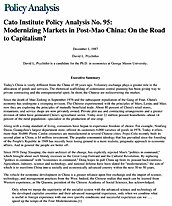Today’s China is vastly different from the China of 10 years ago. Voluntary exchange plays a greater role in the allocation of goods and services. The rhetorical scaffolding of communist central planning has been giving way to private contracting and the entrepreneurial spirit. In short, the Chinese are rediscovering the market.
Since the death of Mao Zedong in September 1976 and the subsequent repudiation of the Gang of Four, China’s economy has undergone a sweeping revision. The Chinese experimented with the principles of Marx, Lenin, and Mao; now they are exploring the principles of mutually beneficial trade. About 80 percent of China’s retail stores, restaurants, and service shops are now privately owned. Private plot use and contracting arrangements and a greater division of labor have permeated China’s agricultural sector. Today over 22 million peasant households–about 14 percent of the rural population–specialize in the production of one crop.
Along with a rising standard of living, consumers have begun to experience freedom of choice. For example, Nonfang Daxia, Guangzhou’s largest department store, offered its customers 6,000 varieties of goods in 1978. Today it offers more than 30,000. Pierre Cardin cosmetics are manufactured in several Chinese cities. Pepsi-Cola recently built its second plant in China, a $4 million investment. The popular communist ideology that has prevailed since the founding of the People’s Republic in 1949 has recently been losing ground to a more realistic, pragmatic approach to economic affairs. And in general the people are better off.
Since 1978 Deng Xiaoping, the main architect of the change, has explicitly rejected Mao’s “politics in command,” which brought about such bloody excesses as the Great Leap Forward and the Cultural Revolution. By replacing “politics in command” with “economics in command,” Denq hopes to pull China up from its peasant backwardness. Agriculture, industry, science and technology, and national defense have been slated for “modernization,” the aim of which is to transform China into a socially and economically advanced country within the next 30 to 50 years.
The vehicle for economic development in China is a greater reliance upon free exchange and the import of science, technology, and management practices from the West. Indeed, the Chinese realize that much can be learned from Western experience, as Hu Qiaomu, president of the Chinese Academy of Social Sciences, has acknowledged:
Only when we merge the superiority of the socialist system with the advanced science and technology of the developed capitalist countries and their advanced managerial experience, only when we combine what is useful in foreign experience with our own specific conditions and successful experience can we … speed up the tempo of the Four Modernizations.[1]
The Chinese do not claim, “We are all capitalists now.” Instead, as Deng has said, the reforms are a way of “perfecting communism through capitalism.”[2]
But just what does “perfecting communism through capitalism” mean? Such phrases, along with Deng’s initial quick pace and subsequent slowdown in implementing the reforms, have led observers to speculate on the degree to which the Chinese leadership will embrace free-market capitalism. Many share an opinion voiced in a 1984 article in the Economist entitled “The Retreat from Marx”: “The centrally planned economy of Marx, Stalin, and Mao is to be stopped in its dirigiste tracks and put on the market road; the traffic, if good intentions hold, will now be regulated by profits and prices rather than by bureaucrats in Peking.”[3] Others, however, are harder to convince. After all, they ask, what incentives do the firmly entrenched bureaucrats have to dismantle the central planning apparatus? It is hard for those bureaucrats to get excited about economic efficiency when their own positions are at stake.
In light of the above, it is natural to ask the following: Is the post-Mao era truly a transition toward free-market capitalism, or is it yet another nominal “rightward” shift in the swinging pendulum of the Chinese Communist party, to be offset in the future by more drastic elements of plunder by the radical left wing? That only time will tell is a true but wholly unsatisfying answer. One thing, however, is clear: since the beginning of 1987 the reforms in China have lost their momentum. A March 1987 issue of the Economist spoke of “The Fading in China”: “The past three months have been a bitter reminder that, when obliged to choose between pressing ahead with reform and keeping the party’s grip over policy, any communist leader is liable to see the case for putting reform second.”[4]
It is not that the party leaders are dizzy with success. Indeed, the opposite may be true: the development of a stronger, more rational economy has created much strain in the political hierarchy. A strong central party destroys an economy, whereas a strong, rational economy weakens a party. What will the planners do when millions of independent plans are successfully coordinated in the market? Perhaps the party has become aware of that dilemma. To understand the current situation, we must understand the nature and history of China’s economic reforms.
About the Author

This work is licensed under a Creative Commons Attribution-NonCommercial-ShareAlike 4.0 International License.
